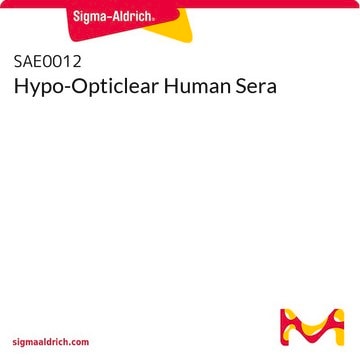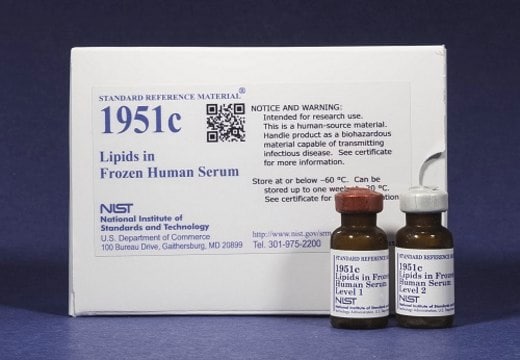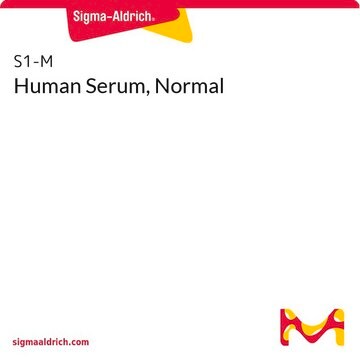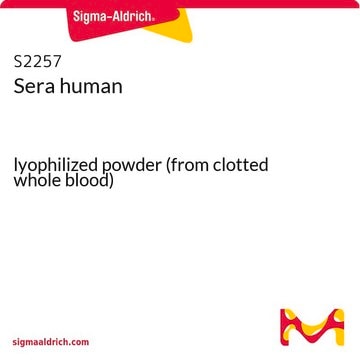NIST909C
Human Serum
NIST® SRM® 909c
Synonym(s):
Blood Serum from Humans
About This Item
Recommended Products
grade
certified reference material
Quality Level
form
liquid
packaging
pkg of 3 x 2 mL
manufacturer/tradename
NIST®
technique(s)
mass spectrometry (MS): suitable
application(s)
clinical testing
format
matrix material
Looking for similar products? Visit Product Comparison Guide
General description
SRM 909C_Cert
SRM 909C_SDS
Application
Features and Benefits
- The certified values are traceable to the International System of Units (SI) for the amount of substance and mass, expressed both in mass concentrations (milligrams per deciliter, micrograms per deciliter, nanograms per milliliter, or grams per liter) and amount concentration (nanomoles per liter or micromoles per liter)
Other Notes
- Refer to the certificate for information on expiry, safety, usage, and storage.
- Notes on biomaterials, disposal, and transport information are available in SDS.
Cholesterol, Creatinine, Glycerides, Urea, Calcium (Ca), Chloride (Cl), Magnesium (Mg), Potassium (K), Sodium (Na), Iron (Fe), Selenium (Se), Transferrin (Tf)
Reference/Informational value is provided for the following analytes.
Total Protein, Disialo Tf, Trisialo Tf, Tetrasialo Tf, Pentasialo Tf, Hexasialo Tf
See certificate for values and more details at nist.gov/SRM.
Analysis Note
Legal Information
Disclaimer
Storage Class Code
10 - Combustible liquids
WGK
WGK 1
Flash Point(F)
Not applicable
Flash Point(C)
Not applicable
Regulatory Listings
Regulatory Listings are mainly provided for chemical products. Only limited information can be provided here for non-chemical products. No entry means none of the components are listed. It is the user’s obligation to ensure the safe and legal use of the product.
JAN Code
NIST909C:
Choose from one of the most recent versions:
Certificates of Analysis (COA)
Sorry, we don't have COAs for this product available online at this time.
If you need assistance, please contact Customer Support.
Already Own This Product?
Find documentation for the products that you have recently purchased in the Document Library.
Customers Also Viewed
Our team of scientists has experience in all areas of research including Life Science, Material Science, Chemical Synthesis, Chromatography, Analytical and many others.
Contact Technical Service






